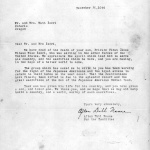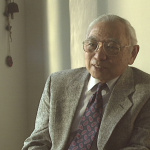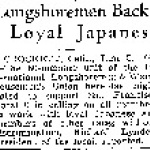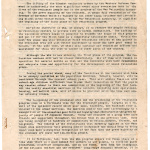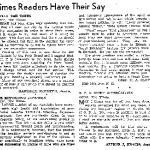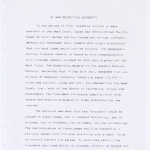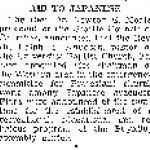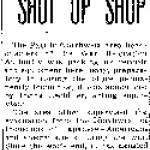Morris Opler
| Name | Morris E. Opler |
|---|---|
| Born | May 16 1907 |
| Died | May 13 1996 |
| Birth Location | Buffalo, NY |
Cultural anthropologist and community analyst at Manzanar . As community analyst at Manzanar, Morris E. Opler (1907–96) cogently documented various aspects of life there with great sympathy for the incarcerated Japanese Americans. He also ghost wrote two key legal briefs for the Japanese American Citizens League (JACL) in the Hirabayashi and Korematsu Supreme Court cases. He enjoyed a long and distinguished academic career after the war mostly at Cornell University, with a lifelong specialization on the Apache peoples. His younger brother Marvin was also an anthropologist and was the community analyst at Tule Lake .
Before the War
Morris Edward Opler was born on May 16, 1907, in Buffalo, New York. He attended the University of Buffalo, graduating with a degree in sociology in 1929 and an M.A. in anthropology in 1930. He subsequently entered the doctoral program at the University of Chicago, earning his Ph.D. in 1933 with a dissertation on Apache ethnology, an area of focus that would remain throughout his career. He conducted fieldwork among the Apache over the next several years while working as a research associate at the University of Chicago and later worked for the Bureau of Indian Affairs in 1936 and 1937. After a stint as a lecturer at Reed College, he became as assistant professor at Claremont College in Southern California in 1938. Between 1938 and 1942, he published three books on the folklore of various Apache peoples.
Community Analyst at Manzanar
While at Claremont, Opler was asked to come to Manzanar to become a part of the Community Analysis Section (CAS). He arrived there in April of 1943. Familiar with Japanese American students whom he had taught—he "knew them as kids who were interested in baseball"—he came to be a strong opponent of the mass incarceration. [1] His reports from Manzanar thoroughly documented the aftermath of the December 1942 " riot ," the loyalty questionnaire crisis, the nascent draft resistance movement, and many other aspects of life at the camp that continue to be relied upon by scholars today. In the process, he openly disagreed with the administrative leadership at Manzanar, particularly camp director Ralph Merritt, and had an impact on changing policies there on at least one occasion. [2]
His disaffection with the incarceration led him to voluntarily write two important legal briefs in his spare time. A.L. Wirin of the Los Angeles American Civil Liberties Union office approached him about writing an amicus brief in the Hirabayashi v. U.S. Supreme Court case for the JACL. Working nights after his job at Manzanar, he authored a 126 page brief that made the case that Japanese Americans were like other immigrant groups in maintaining some ethnic practices while seeking assimilation and acceptance in American society and also pointing out the racially discriminatory nature of John DeWitt 's statements to argue that his military orders drew on factors beyond "military necessity." A year later, Wirin asked Opler to again write an amicus brief for the JACL in the Korematsu v. U.S. case. His 200 page brief cited over 300 academic works and newspaper articles and again zeroed in on DeWitt and specifically accused him of racism. "We contend that General DeWitt accepted the views of racists instead of the principles of democracy because he is himself a confessed racist," he wrote. "General DeWitt has gone to unusual lengths to make perfectly clear his unalterable hostility, on racial grounds , to all persons of Japanese ancestry, regardless of citizenship and regardless of evidences of loyalty." [3] He also contributed to the JACL brief in the Regan v. King case. His authorship of these briefs was kept hidden at the time.
Postwar Academic Career
Opler left Manzanar in 1944 to work for the Office of War Information , becoming deputy chief of the Foreign Morale Analysis Division, where he argued forcefully for the postwar retention of the Japanese emperor. These two wartime posts piqued his interest in Asian Studies, which would become his second area of focus in the postwar years. After a brief stint as a visiting professor at Howard University in 1945 and two years at Harvard, he joined the faculty at Cornell University in 1948, where he would remain until 1969, becoming the director of the university’s South Asia program. He finished his academic career at the University of Oklahoma in 1977. His postwar career was marred by "McCarthyistic attacks" on other anthropologists, most notably Leslie White, with whom he had studied at the University of Buffalo. [4] Throughout his life, he remained a strong advocate for Apache rights. He passed away on May 13, 1996.
For More Information
Hayashi, Brian Masaru. Democratizing the Enemy: The Japanese American Internment . Princeton: Princeton University Press, 2004.
Irons, Peter. Justice at War: The Story of the Japanese American Internment Cases . New York: Oxford University Press, 1983.
Price, David H. Anthropological Intelligence: The Deployment and Neglect of American Anthropology in the Second World War . Durham, N.C.: Duke University Press, 2008.
———, and William J. Peace. "Un-American Anthropological Thought: The Opler-Meggers Exchange." Journal of Anthropological Research 59.2 (2003): 183–203.
Webster, Anthony K., and Scott Rushforth. "Morris Edward Opler (1907–1996)." American Anthropologist 102.2 (June 2000): 328–29.
Zamora, Mario D., J. Michael Mahar, and Henry Orenstein. Themes in Culture (Essays in Honor of Morris E. Opler) . Quezon City, Philippines: Kayumanggi Publishers, 1971.
Footnotes
- ↑ Cited in Peter Irons, Justice at War: The Story of the Japanese American Internment Cases (New York: Oxford University Press, 1983), 192.
- ↑ Michi Weglyn, Years of Infamy: The Untold Story of America's Concentration Camps (New York: William Morrow & Co., 1976. Updated ed. Seattle: University of Washington Press, 1996), 143.
- ↑ Irons, Justice at War , 305–06.
- ↑ David H. Price, and William J. Peace, "Un-American Anthropological Thought: The Opler-Meggers Exchange," Journal of Anthropological Research 59.2 (2003): 183–203.
Last updated Feb. 15, 2024, 9:52 p.m..

